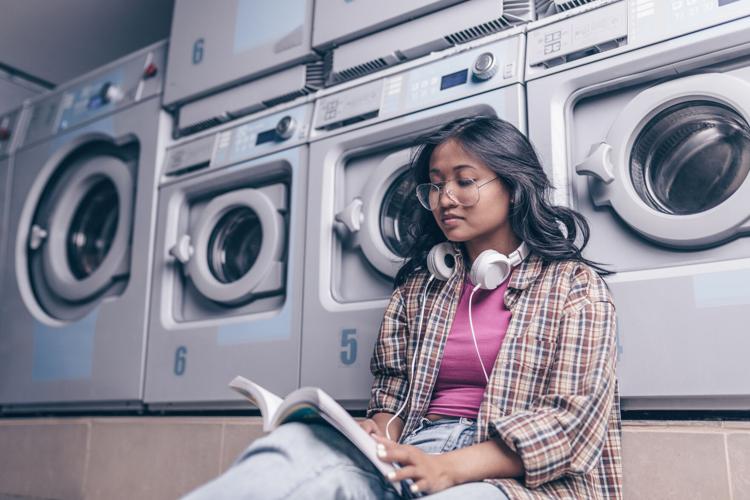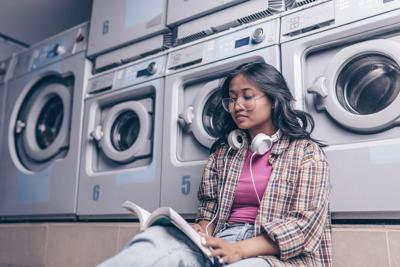For first-year post-secondary students arriving on campus, navigating the duties of day-to-day life while also attending class can be overwhelming.
Not only are you working toward your degree or certification, but for the first time you may also be budgeting, grocery shopping and meal planning, doing your own laundry and cleaning, and making your own appointments or managing health care.
“I tell them to take a deep breath. That it will be okay. And ask for help — every door is the right door and someone will point you in the right direction,” said Pamela Charbonneau, director of student success at the University of Waterloo.
“Relax, and don’t be afraid to ask for help. I also tell them to just pick one thing; you don’t need to figure it out all at the same time. Just pick one thing. This week I will learn to do laundry. Next week I will learn to buy food to make a new meal.”

Pamela Charbonneau, director of student success at the University of Waterloo
ProvidedTo help its students, the University of Waterloo has an Adulting Guide, a website that offers them the opportunity to learn more about life skills. Formerly called Adulting 101, this resource includes information on how to prioritize mental and physical wellbeing, manage finances, grocery shopping, doing laundry — things they might have wished they learned sooner but did not before leaving home for post-secondary school.
“The term ‘adulting’ was coined as a fun way of bringing their attention to a variety of things and areas where they need to develop more skills or learn more knowledge that will help them be successful.” Charbonneau said. “These are things that are now in their hands and maybe used to be in Mom and Dad’s hands.”
Charbonneau said is it pretty standard on most Canadian campuses for schools to offer online and in-person resources like this to students so they can access information and supports they might need to build their independence. She said it not only allows students to learn more about their strengths and weaknesses but also build resiliency and skills that can help on their career paths.
“This is the time in their life when they are also becoming young adults,” she said. “They are the ones now in the driver’s seat in terms of taking care of themselves. So, it is helping them think of that proactively and building good habits and good routines — basic things like eating, sleeping, studying and exercising that may have been programed for them in the past.”
We recently spoke to Charbonneau about including life skills as part of a student experience in post-secondary education.
Life skills don’t seem like a traditional focus at post-secondary institutions. Why is it being offered to students who are interested in it?
Nothing changed, even when we came through school 20 or 30 years ago these were the types of things that maybe we did not have experience with. I think it has always been there, but I think we have just put a little more of a fun spin on and gets their attention and interest. And being proactive is a big part of it — not waiting until you get into trouble but building good routines and habits and taking ownership over their life skills.
What do you hear from students when they arrive at school and have more oversight over their day-to-day lives?
They seem to have less experience with it, so there are definitely some nerves around that, and anxiety to some degree for some students probably. Having a website that pulls it all together, and helps them know that they are not alone, that they are not the only ones going through that and having to learn some of those things, and to trust there are people here to help them figure it out.
You mention they might have less experience. Is it generational or COVID related, or just not being taught in school anymore?
It is a few things. Definitely the COVID era is still having an impact on our young people, I see it in my own kids for sure. And our parenting style probably is part of it in terms of how early we start to create and encourage independence in our kids in terms of whether they have their own experience doing their own laundry or making their own appointments or making a meal or doing a budget.
We have students coming with various levels of experience and comfort. Maybe they have experience but they haven’t been comfortable with it. So, they do feel a bit of nervousness about it.
Self-advocacy seems to be a key part of what they are learning and might be different from what they are used to in their home environment. Why is that important?
People ask what the most important thing or aspect is, and I think that is it — that self-advocacy component. They need to put up their hand and take that step to ask for what they need and seek out the resources or experiences that they are looking for when they move away from home and come to a university or college campus.
Depending on how much independence they had in the past, having that self-confidence and self-awareness is a big part of being able to advocate for themselves. It will only help them. They will meet some challenges along the way, and they need to ability to feel confident and resilient and “Oh, I will figure it out,” and “I know I can ask people for help.”
Also, with relationship and how they interpret interactions.
I see that sometimes when they are navigating. When they hear a “no” or something doesn’t work out, they stop there versus saying, “Maybe I should ask someone else,” or “Maybe I should try again and present it differently.” Learning more about how to self-advocate and be assertive is a big part of it. They often give up after the first hurdle sometimes.
What do you hear from students after they access these resources?
Often students when they become aware of the resources or come to a workshop or interact with staff or peers even, their shoulders drop and they feel, “Okay. Alright. I will be able to figure this out,” and maybe it is not as big as they built it up to be, and other students have gone through this before them. They are appreciative for the resources and supports made available.
What is your advice to parents who may be used to having a more active role in their now-adult child’s life in the past?
It is going to be hard. Yeah, it is going to be hard. But you are stepping more into that role of being a coach now. Try not to give advice if they haven’t asked for it. Step back and let them struggle a little bit, let them figure it out. Just let them know you are there for them. That connection and communication is really important, but you need to give them space to figure things out themselves — and to fail and make mistakes and trust they will figure it out.
This interview has been edited for length and clarity.




























